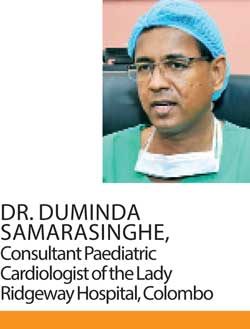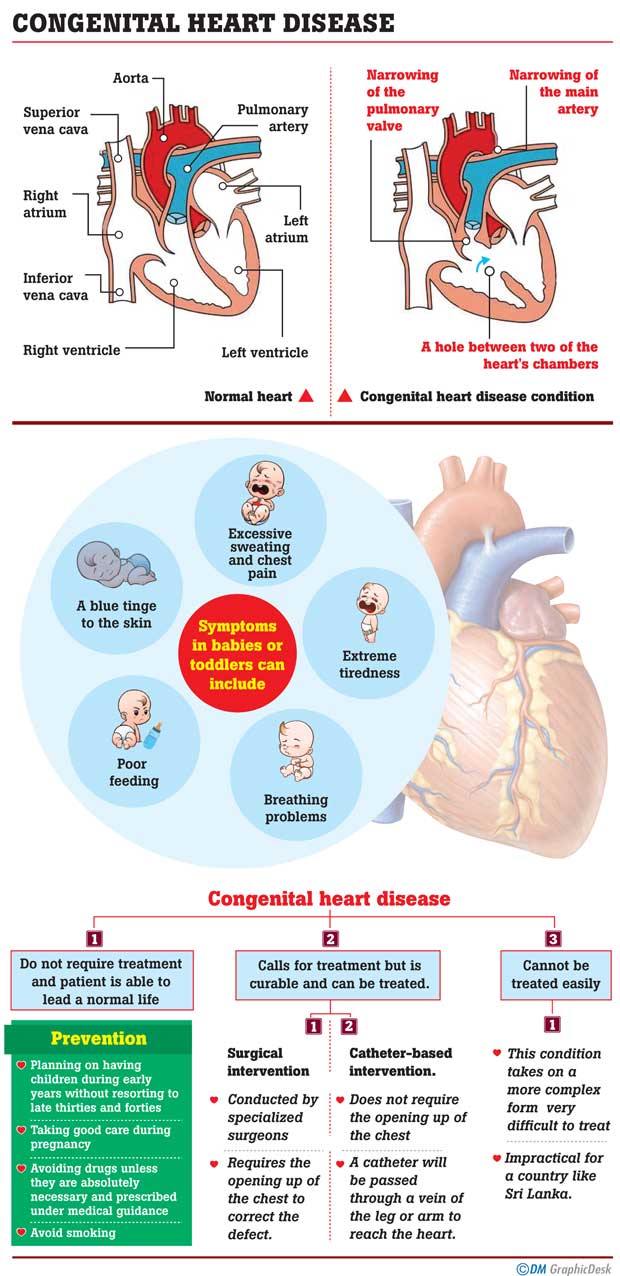09 Feb 2018 - {{hitsCtrl.values.hits}}

 Your health faces a fair share of challenges everyday. Adhering to positive and healthy life patterns helps you support your body’s defence system in safeguarding health. However this doesn’t happen always when people are presented with the option of shielding themselves against the consequences of malady. It is especially quite unfortunate when your life is predestined to be inflicted by disease even before birth. Such is the reality of ‘congenital heart disease’. While it is disheartening to hear that there are innocent young people threatened with heart complications at the time of birth, medical science has wasted no time in progressing to an era where there seems to be hope for life through treatment. Dr. Duminda Samarasinghe, Consultant Paediatric Cardiologist of the Lady Ridgeway Hospital, Colombo spoke to Health Capsule on congenital heart disease.
Your health faces a fair share of challenges everyday. Adhering to positive and healthy life patterns helps you support your body’s defence system in safeguarding health. However this doesn’t happen always when people are presented with the option of shielding themselves against the consequences of malady. It is especially quite unfortunate when your life is predestined to be inflicted by disease even before birth. Such is the reality of ‘congenital heart disease’. While it is disheartening to hear that there are innocent young people threatened with heart complications at the time of birth, medical science has wasted no time in progressing to an era where there seems to be hope for life through treatment. Dr. Duminda Samarasinghe, Consultant Paediatric Cardiologist of the Lady Ridgeway Hospital, Colombo spoke to Health Capsule on congenital heart disease.
Congenital heart diseases occur at birth. They are defects in the structure of the heart that arise at the time the baby develops within the mother’s womb. “Conditions such as hole in the heart, narrow blood vessels, abnormal drainage and positioning of the blood vessels of the heart are a few such ailments that come under the condition called congenital disease.This condition possesses some risks, but the risk isn’t defined. The congenital condition does not necessarily mean that it is hereditary,” explained Dr. Samarasinghe.
Generally 6-8 out of 1000 normal new born babies suffer from congenital heart disease in Sri Lanka. Based on these statistics, Dr. Samarasinghe stated that around 3000 children are estimated to suffer from congenital heart disease annually. A child born with Down Syndrome is threatened with a 40% probability of suffering from congenital heart disease.
Causes for the condition 
Genetics take major blame for causing defects in the heart structure thus leading to congenital heart disease. According to Dr. Samarasinghe, it is very rarely caused by other reasons. “Conditions such as diabetes, viral infections and illnesses in the mother may result in adverse effects on the baby during pregnancy. Drugs taken as medication for various ailments during pregnancy can also affect the baby and lead to this condition,” he warned. Lithium in drugs taken for psychiatric conditions and alcohol consumption during pregnancy are also linked to congenital heart diseases. The cardiologist added that in Sri Lanka, 90-95% of the congenital heart defects have no specific cause that can be accounted for. “The heart is a complex structure. Congenital heart diseases occur when a defect arises in some element somewhere in the heart. It is uncontrolled,” he expressed.
Signs and symptoms
Dr. Samarasinghe stated that there are give-away signs to identify a case of congenital heart disease. These signs help health authorities to take immediate medical action. “The baby appears blue at birth. The baby may be breathless and could develop breathing abnormalities. There can also be recurrent breathing infections like pneumonia. Display of poor weight gain and poor feeding habits of the baby are some signs. The doctor may detect chest murmurs coming from the heart which are not normal. If these symptoms are observed, immediate medical attention should be sought,” he stressed.
The effects of congenital heart disease may be present since birth or may even appear during later years of adulthood. It depends on the lesion and the individual. However if this condition is left untreated it leads to fatality.
Dr. Samarasinghe accentuated that the best and most resorted to method of diagnosing congenital heart disease is by way of an echocardiogram. “It is an advanced way of detecting even the most minor lesions of the heart,” he added.
Timely treatment
The Cardiologist explained that congenital heart disease is divided into 3 cases. “The type of congenital heart defects that come under the first category are minor lesions. These issues do not require treatment and patient is able to lead a normal life,” the cardiologist stated.
“The second case of congenital heart disease calls for treatment, but is curable and can be treated. This treatment is of two ways. Surgical intervention is the first method which is conducted by specialized surgeons. As the word ‘surgery’ implies, this requires the opening up of the chest to correct the defect. The second method of treatment is the catheter-based intervention. This treatment is performed by a cardiologist. This is a more advanced method of treatment which does not require the opening up of the chest to correct the defect. Catheters are medical devices in the form of thin tubes. In this case, a catheter will be passed through a vein of the leg or arm to reach the heart and the defect will be corrected. This method is performed under expert advice,” continued Dr.Samarasinghe.
The third case is unfortunately one that cannot be treated easily. This condition takes on a more complex form where treatment is very difficult. He further added that resorting to the type of treatment that is demanded by these kinds of conditions is impractical when treating patients in a country like Sri Lanka.
Prevention, not always an option
Speaking on prevention, congenital heart disease is a condition where prevention can do so little. It is not an option, but every little effort is worth it. “Planning on having children during early years without resorting to late thirties and forties is a precautionary measure that can be considered. The more later you have children in life, the higher are the risks of giving birth to children with Down Syndrome. This makes way for a higher probability of congenital heart disease in the baby,” said Dr. Samarasinghe. Mothers taking good care of themselves during pregnancy is another positive step. Avoiding drugs unless they are absolutely necessary and prescribed under medical guidance. Avoiding smoking and alcoholic consumption, remaining vigilant to staying healthy during pregnancy and taking steps to avoid unnecessary exposure to viruses and illnesses such as German Measles and Chicken Pox is vital.
According to Dr. Samarasinghe, treatment has proven successful and 90% of the patients are able to lead normal lives after treatment, provided they adhere to positive lifestyle patterns and medical advice.
Noble initiative
When speaking about saving the little lives threatened by congenital heart disease through treatment, it is important to shed light on a noble initiative, Project Little Hearts. The project strives towards minimizing the number of child deaths that occur through congenital heart disease. It is a project supported by the Sri Lanka College of Paediatricians, that plans to construct a 10-storeyed Cardiac and Critical Care Complex to provide facilities and treatment to ensure that these little hearts keep beating happily for many years.
Citizens of Sri Lanka are invited to join in this noble project by making donations.

23 Dec 2024 12 minute ago
23 Dec 2024 1 hours ago
23 Dec 2024 2 hours ago
23 Dec 2024 2 hours ago
23 Dec 2024 2 hours ago